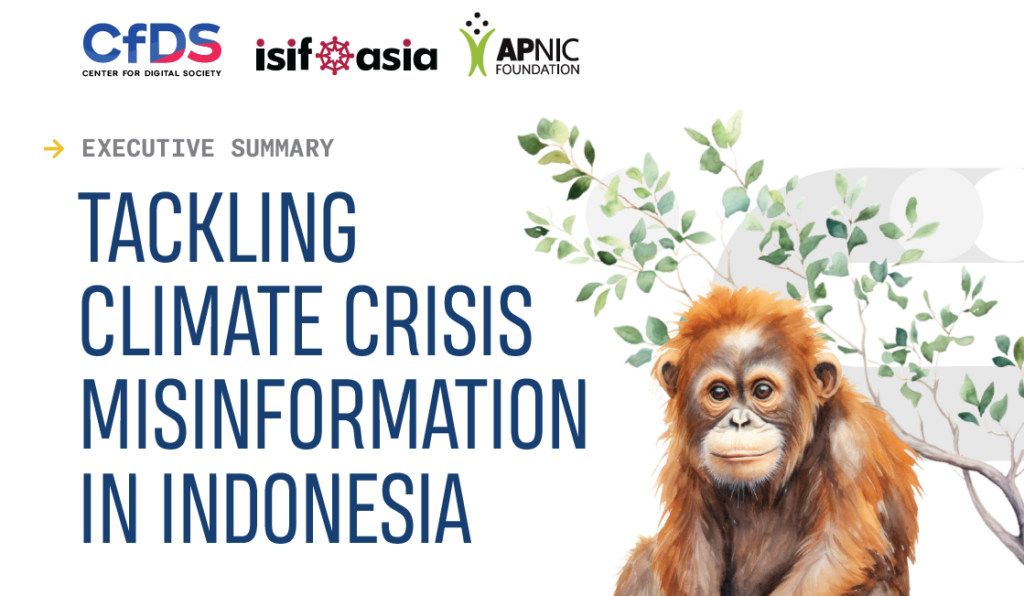Foundation Projects
Tackling Climate Misinformation in Indonesia
Center for Digital Society (CfDS) Universitas Gadjah Mada
Misinformation is one of the most common challenges in digital technology developments today. Of the various misinformation circulating quickly in Indonesia, misinformation regarding the climate crisis is often considered harmless, with low risks and less visibility compared to the COVID-19 pandemic or political misinformation, whose risks are more visible. Climate crisis misinformation has the potential to trigger environmental damage and catalyst important changes to the earth's ecosystem that will harm humans and other living creatures.
This "Tackling Misinformation on the Climate Crisis in Indonesia" research was conducted based on concerns about the spread of climate misinformation, and the fact that efforts to counter it are still quite limited. This fact is exacerbated by the findings of survey-based research conducted by YouGov, which states Indonesia has the highest number of climate-change deniers (climate crisis deniers) in the world and has a high potential for believing and spreading climate crisis misinformation. The climate crisis misinformation phenomenon is noteworthy for two reasons. First, climate crisis misinformation makes people doubt and more in doubt about the climate crisis consensus. Second, climate crisis misinformation makes people distrust the science of the climate crisis. Hence, climate crisis misinformation directly impacts sustaining the climate crisis and hindering climate crisis action or policy.
First, how are the understanding, consumption patterns, and digital literacy skills of Indonesian internet users related to misinformation about the climate crisis? Second, what are the various types of climate crisis misinformation found and verified by various reliable fact-checking sources in Indonesia?
The first question was answered by conducting an online survey in August and September 2023 with 2,401 respondents. The majority of respondents were women (63.2%), single (56.9%), undergraduate graduates (34.7%), and Gen Z (51.6%). Some of the important findings of this research are:
- 24.2% of respondents believe that "the climate crisis is an artificial phenomenon created by global rulers" which leads to believe in global conspiracy theories
- A third of respondents (21.5% agree and 11% strongly agree ) have the perception that the climate crisis is caused by more people committing immoral acts and not obeying their religion
- More than 25% of respondents agree that climate crisis research by academics are controlled by elites
- More than half of respondents (63.5%) answered that social media was their main source of information regarding the climate crisis information
- More than a quarter of respondents, 19.9% agreed and 6.6% strongly agreed, government efforts reducing fuel emissions is a contradiction to a democratic way of life
- Almost half of respondents (47.1%) stated that they had searched for information related to the climate crisis with less intensity
- Almost all respondents (98%) admitted that they had found misinformation climate crisis content on social media
- The majority of respondents, almost 74% of respondents said they were confident in their ability to identify climate crisis misinformation on social media
- More than half of respondents (62.3%) only get to truth verifying stage of the information
- Only a small portion of respondents (20%) created counter-narrative content to fight back climate crisis misinformation
The second question was answered through content analysis of 123 items of climate misinformation content (climate crisis, global warming, and natural disasters). The data was obtained from four fact-checking website pages, namely: www.cekcepat.com, www.turnbackhoax.id, www.jalahoaks.jakarta .go.id, and www.saberhoaks.jabarprov.go.id. Some of the findings of this content analysis are:
- There are seven climate crisis misinformation content types were found, namely: satirical/parody content, wrong connections, misleading content, wrong context, impostor content, manipulated content, and fake content,
- Climate misinformation content have three main themes of relevance, namely religion, politics, and climate-alarmism (climate alarmism)
- Misinformation content often includes name, figures, source, or authority that related to issues about false information
- The four fact-check pages did not find much climate misinformation compared to other issues. However, climate crisis misinformation is often related to political misinformation
- Literacy and critical thinking skills are important to prevent the spread of climate misinformation.
This research offers both academic and practical recommendations. Academically, this research needs to be followed up with mapping policies research for preventing and handling environmental misinformation that not only includes climate crisis misinformation but also general climate, disasters, and global warming misinformation. This research recommends preventing and handling climate crisis misinformation involving various stakeholders such as government, educational institutions, various related communities (Environment, Fact Checking, Digital Literacy, and other relevant communities), religious and community leaders, social influencers, and internet users. Various programs that can be carried out to prevent misinformation on the climate crisis include fact-checking, media monitoring, providing adequate climate crisis information, research, and literacy. Meanwhile, various curative programs include providing reports on climate crisis misinformation mechanisms and the formation of a collaborative task force to handle climate crisis misinformation. The programs themselves can be carried out by individual stakeholders or collaboratively.
Apart from carrying out comprehensive research, the research team also carried out various activities to support the research project to run smoothly and achieve the expected goals. Supporting activities for research projects include the implementation of online campaign activities on social media to voice the issue of climate crisis misinformation, community outreach activities targeting a wider audience in Indonesia, and also ending with dissemination of research results in the hybrid seminars for the public. The project was involved in producing policy briefs which are also based on research findings that have been carried out by researchers.

Related:


